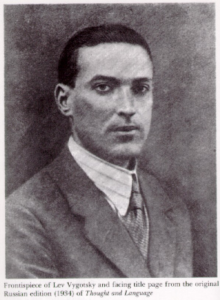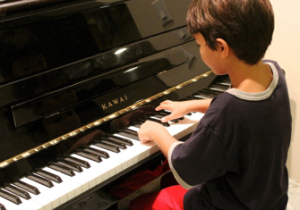5.4 Vygotsky’s Sociocultural Theory

Vygotsky’s sociocultural theory suggests that children’s learning is influenced by cultural and social factors, such as the role of social interaction in the development of speech and reasoning in children. He also posited that community plays a central role in the process of children’s “meaning making.” Vygotsky’s theories were useful in expanding awareness of the role that culture plays in fostering the development of children.
Barbara Rogoff and her collaborators utilized Vygotsky’s theory to inform their research with Mayan children in Mexico and Guatemala, describing how much of the children’s learning came from observing and helping with the family and community endeavors around them (Rogoff & Angelillo, 2002). Rogoff developed the theory of guided participation, which describes the collaborative transfer of knowledge between a guide (e.g., parent, caregiver, or more skilled peer) and apprentice (the child). Cultural practices inform how children are integrated into family functions and how their interest and attention to ongoing events, such as helping with cooking, cleaning, weaving, or other tasks, is encouraged and facilitated. Therefore, Rogoff’s theories focused on the role of cultural practices in informing children’s developmental processes rather than on the role of structured instruction.
Video 5.2. Rogoff’s research on guided participation: U.S. sample. “Rogoff” by SonyaDST.
Video 5.3. Rogoff’s research in Guatemala and Mexico: Keen attention. “Keen Attention and Learning” by Barbara Rogoff.
Think about how your racial, ethnic, or national culture may have guided your interests as a child. Just to provide a few examples, children in Brazil are often exposed to a variety of creative art forms, including music and dance; in Switzerland, children are often taught the importance of financial literacy; and in Kenya, children are often taught the value of entrepreneurship. These early nudges can form the foundation for lifelong learning.

For instance, if you grew up in a culture that values music education, you may have found yourself sitting in front of a musical instrument earlier in life than your peers from other cultures. As you learned to play your instrument, your brain developed in tandem with your knowledge of music, making it easier to integrate new musical ideas into your semantic memory. In short, culture plays a significant role in determining childhood exposure, and early exposure to content can explain vast differences in long-term memory.
Media Attributions
- Vygotsky_Yang is licensed under a Public Domain license
- Young pianist_Yang
